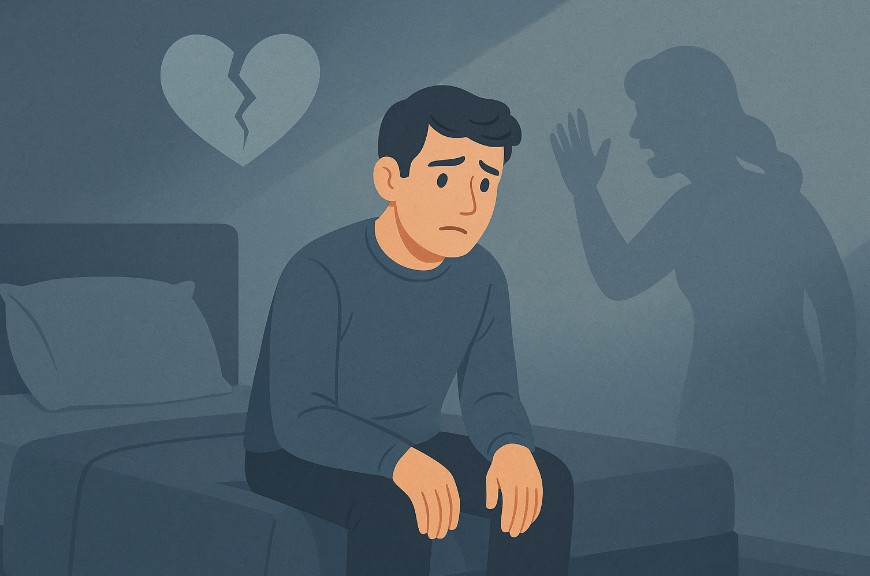Why Is My Wife Hitting Me? | 15 Common Reasons
In the UK alone, around 1 in 6 men will experience domestic abuse in their lifetime. According to the Office for National Statistics, over 699,000 men reported being victims of abuse in 2022. And yet, male victims often feel invisible, silenced by stigma and disbelief.
If you’re asking, “Why is my wife hitting me?”, this blog explores 15 possible reasons behind spousal violence, the psychology and context surrounding it, and how UK-based men can seek help, stay safe, and reclaim control of their lives.
Understanding Domestic Abuse Towards Men
For decades, domestic violence conversations have revolved around female victims — but the truth is, abuse is not gender-specific.
Men face unique challenges:
- Fear of being mocked or not believed
- Societal expectations to “man up” or be physically dominant
- Reluctance to report abuse due to shame
- Limited support resources and societal awareness
What qualifies as abuse?
In the UK, abuse isn’t just physical. It includes:
- Emotional abuse: belittling, gaslighting, blame-shifting
- Psychological control: threats, isolation, intimidation
- Financial abuse: withholding access to money, coercive control
- Sexual coercion: being forced into intimacy
When your spouse resorts to hitting, it crosses a line into criminal behaviour. No context justifies being assaulted by your partner ever.
15 Common Reasons Why a Wife May Resort to Hitting
1. Built-Up Emotional Frustration

In many long-term relationships, communication begins to erode over time. What may start as small disagreements can build up into a mountain of resentment and unspoken grievances.
If your wife feels emotionally unheard, dismissed, or misunderstood repeatedly, these frustrations can start to manifest physically especially when she lacks the tools to express or process her feelings in a healthy way.
Rather than seeking open discussion or emotional intimacy, she might lash out in anger or physical aggression during arguments. Often, this type of behaviour is reactive rather than calculated but it still causes real harm and trauma. Emotional bottling combined with unresolved issues often triggers these bursts of violence when there’s no healthy outlet.
- Frequent emotional outbursts
- Passive-aggressive behaviour leading to physical escalation
- Anger over past issues suddenly boiling over
2. Past Trauma or PTSD

A person’s unresolved trauma whether from childhood, previous relationships, or even family upbringing can significantly shape how they behave in adult relationships.
If your wife has experienced abuse in the past, she may subconsciously associate conflict or emotional vulnerability with danger. This could lead to fight-or-flight reactions, where she resorts to aggression as a form of emotional or physical defence.
Post-Traumatic Stress Disorder (PTSD) and Complex PTSD (C-PTSD) are especially influential in this context. Physical aggression may become a deeply ingrained response tied to emotional flashbacks or perceived threats, even when the present situation is not genuinely dangerous.
- Disproportionate reactions to seemingly minor disagreements
- Hypervigilance or extreme mood swings
- Mention of past trauma or abuse, especially untreated
3. Control and Power Dynamics
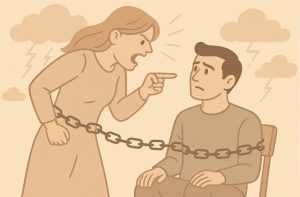
Not all abuse stems from emotional dysregulation sometimes, it’s about control and dominance. In some cases, physical violence is a deliberate tool to exert power over a partner. This may involve isolating the victim from family and friends, dictating behaviour, or using fear as a method of manipulation.
This kind of abuse is more systemic and calculated. Your wife might hit you to assert authority, intimidate you, or establish a sense of superiority in the relationship. It’s part of a larger pattern of coercive control, which is now recognised as a criminal offence in the UK.
- She blames you for her violence
- She apologises but repeats the same behaviour
- There’s a clear pattern of fear, control, and submission in the relationship
4. Mental Health Disorders

Certain untreated mental health disorders can result in volatile and erratic behaviour, including episodes of violence. Conditions such as:
- Borderline Personality Disorder (BPD)
- Bipolar Disorder (especially manic phases)
- Intermittent Explosive Disorder (IED)
- Paranoid Personality Disorder
…can impair emotional regulation and increase impulsivity. If your wife is experiencing extreme mood swings, paranoia, delusions, or intense fear of abandonment, it may escalate into aggression during moments of distress or confrontation.
It’s important to note that having a mental illness does not excuse violence, but it may help explain the behaviour and influence the type of intervention or support required.
- Unpredictable mood swings
- Sudden rage followed by deep remorse
- Refusal to seek help despite recurring issues
5. Influence of Substance Abuse

Alcohol, prescription drugs, and recreational substances can significantly impair judgment, emotional control, and physical restraint. If your wife has a substance abuse issue, she may become verbally or physically aggressive while under the influence, even if she’s calm and loving while sober.
Substance-related violence often follows a cyclical pattern arguments, intoxication, abuse, apologies, and repetition. Over time, this can lead to a toxic environment where you’re constantly walking on eggshells, unsure of what will trigger the next episode.
- Violence primarily occurs during or after drinking/drug use
- Blackouts or memory loss after incidents
- Promises to stop using, followed by relapses
6. Unhealthy Communication Patterns
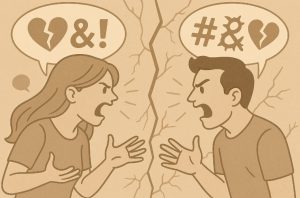
When both partners lack healthy communication tools, emotions like anger, sadness, or fear are often misdirected. Instead of openly discussing feelings, your wife may revert to sarcasm, yelling, blame, or eventually hitting as a misguided way of expressing herself.
This is especially common in relationships where emotional safety is lacking, and conflict resolution has never been properly modelled or taught. If disagreements routinely spiral out of control, it may reflect a broader pattern of toxic interaction rather than isolated violence.
- Escalation of small arguments into major fights
- Name-calling, stonewalling, or emotional withdrawal
- Physical violence following shouting matches
7. Infidelity or Suspected Cheating

Trust is one of the pillars of any relationship. If your wife believes you’ve cheated or even if she’s feeling insecure about your emotional loyalty she may experience intense emotional pain, including feelings of rejection, betrayal, or humiliation. These emotions, when unregulated, can provoke violent outbursts, especially in highly volatile individuals.
Interestingly, some partners who are cheating themselves may also become physically aggressive due to guilt projection pushing blame onto their partner in an attempt to relieve internal stress or suspicion.
Whether it’s your actions, her suspicions, or something entirely imagined, jealousy and betrayal are powerful emotional states that can lead to aggression in unhealthy relationships.
- Sudden accusations of cheating with no clear evidence
- Monitoring your phone, social media, or whereabouts
- Rage episodes triggered by perceived disloyalty
8. Financial Stress
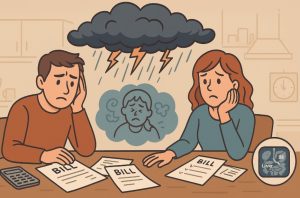
Money issues are among the top contributors to relationship strain and can easily lead to conflict if not managed collaboratively. If your wife is feeling overwhelmed by financial obligations such as rent, debts, job instability, or childcare costs she may begin to externalise that pressure as anger.
And if she feels like you’re not doing your “share,” or is insecure about her own financial contribution, that pressure can escalate into arguments that turn physical.
It’s also possible that financial stress triggers power imbalances, especially if one partner earns significantly more. That perceived inequity may cause resentment, which could eventually explode in aggressive behaviour during times of financial hardship
- Violence during money discussions or bills
- She blames you for financial problems
- Signs of anxiety or irritability when discussing income or expenses
9. Cultural or Family Background
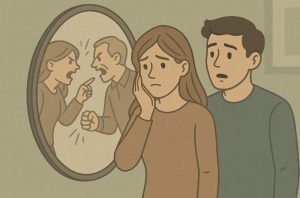
Violence is often learned behaviour. If your wife was raised in a household where parents resolved conflict through yelling, intimidation, or physical abuse, she may have internalised these patterns as “normal.” Similarly, if her culture or family dynamics discouraged emotional vulnerability or supported dominance over a partner, she may believe hitting is an acceptable form of expression or control.
Breaking generational cycles of abuse requires awareness, therapy, and re-education. Without these, people often repeat what they experienced even if they once vowed never to become that person.
- Her family history includes domestic violence
- She minimises or justifies aggressive behaviour
- Difficulty expressing emotions without aggression
10. Emotional Manipulation
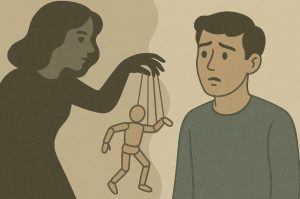
In some abusive relationships, violence is used strategically, not impulsively. Your wife might hit you to provoke guilt, gain sympathy, or reassert emotional control especially if you try to set boundaries or assert independence.
This form of abuse is tied closely to emotional blackmail and narcissistic behaviours. The pattern often looks like this:
- You try to confront an issue or express how you feel
- She reacts violently, making you feel unsafe or responsible
- Afterwards, she apologises, cries, or blames external stress
- You forgive her, but the cycle repeats
This repeated emotional cycle traps victims in a loop of confusion and dependence, which is a hallmark of coercive control.
- She hurts you, then blames you for it
- She uses tears or threats of self-harm to redirect blame
- You feel responsible for “setting her off”
11. Resentment or Jealousy

Even subtle feelings of envy, inadequacy, or comparison can build up into resentment. Your wife might feel jealous of your career, relationships, confidence, or how others perceive you especially if she is struggling with her own sense of identity or purpose.
If these feelings aren’t acknowledged or resolved, they may fester and surface through criticism, hostility, or physical aggression. It’s a destructive way of trying to “level the playing field” by emotionally or physically bringing you down to how she feels internally.
- She downplays your achievements
- She shows hostility when you succeed
- Outbursts follow praise or attention you receive from others
12. Insecurity and Low Self-Esteem

A person who struggles with low self-worth may become overly sensitive to perceived slights, rejections, or criticisms. If your wife feels that she is “not good enough,” she may misinterpret your actions or words as attacks on her value leading to defensive and sometimes violent reactions.
These feelings of inadequacy can also make her emotionally reactive, seeking to hurt you before you have a chance to “abandon” or criticise her whether or not you had any intention of doing so. This is often rooted in attachment trauma or self-image issues.
- Extreme overreactions to harmless comments
- She frequently asks for reassurance, yet reacts angrily
- Physical aggression after emotional vulnerability
13. Anger Management Issues

Some people simply haven’t learned to manage anger appropriately. If your wife flies into rages over minor inconveniences, breaks objects, or becomes violent in traffic or queues it’s likely she’s struggling with impulse control and rage regulation.
These outbursts are often a response to perceived disrespect, frustration, or unmet expectations. When directed at a partner, it becomes domestic violence. Anger management therapy is often essential to help individuals recognise and redirect this energy in non-destructive ways.
- She lashes out over small things
- History of angry outbursts in other environments (work, family)
- Little to no remorse after hitting
14. Lack of Conflict Resolution Skills
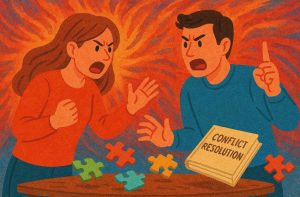
In relationships, disagreements are normal. But when someone doesn’t know how to disagree without attacking, they may default to shouting, blaming, or even hitting. If your wife wasn’t taught constructive ways to manage conflict such as active listening, compromise, or empathy she may interpret all disagreement as personal rejection or betrayal.
This lack of skill turns ordinary arguments into high-stress events that can easily spiral into aggression.
- She refuses to talk calmly during disagreements
- She insists on “winning” arguments at all costs
- She becomes physically threatening when upset
15. Psychological Projection

Projection is a defence mechanism where a person attributes their own uncomfortable thoughts or feelings to someone else. For example, if your wife feels guilty, ashamed, or insecure, she might accuse you of those feelings and punish you for them. Over time, this mental reversal can lead to conflict, blame, and even physical violence aimed at relieving her internal discomfort.
If she’s projecting and you’re unaware, it can feel incredibly confusing. You may find yourself defending against actions or thoughts you never had while she becomes increasingly aggressive toward you.
- Accusations that seem out of nowhere
- She frequently misinterprets your intentions
- She reacts with anger to things you haven’t said or done
What Should You Do If Your Wife Is Hitting You?
It can be incredibly confusing and painful to experience abuse from someone you love. But it’s essential to prioritise your safety. Here’s what you can do:
- Create a safety plan: Have a place to go if things escalate a friend’s house, hotel, or family member.
- Document everything: Save text messages, take photos of injuries, and keep a journal with dates.
- Avoid retaliation: While your instinct might be to defend yourself, physical retaliation could hurt your legal standing.
- Call 999 if you are in immediate danger.
- Seek professional help: A GP, therapist, or domestic violence service can guide you in next steps.
Legal Rights and Support Services in the UK
Domestic abuse is a crime in the UK, regardless of the victim’s gender. You are entitled to legal protection and support services.
Organisations That Can Help:
ManKind Initiative
- UK-based charity offering support to male victims
- Helpline: 01823 334244
- Website: www.mankind.org.uk
Respect UK – Men’s Advice Line
- Confidential advice and emotional support
- Helpline: 0808 801 0327
- Website: www.respect.uk.net
Citizens Advice
- Free legal advice on housing, protective orders, divorce
- Website: www.citizensadvice.org.uk
Your Legal Options
- Apply for a non-molestation order (restraining order)
- Request an occupation order to remove the abusive partner from the home
- Press charges for assault, if desired
Breaking the Silence: Why Male Victims Must Speak Out
Society tends to disbelieve or ridicule men who report abuse. This silence only allows abusers to continue harming others.
By speaking out:
- You take back control of your life
- You inspire others to seek help
- You break generational cycles of abuse
- You challenge dangerous gender stereotypes
Quick Comparison – Signs of Healthy vs Abusive Relationships
| Behaviour | Healthy Relationship | Abusive Relationship |
| Conflict | Open, respectful dialogue | Physical or verbal aggression |
| Respect | Mutual and consistent | Dominance and control |
| Emotions | Shared support | Guilt, fear, emotional harm |
| Disagreements | Resolved constructively | Escalate into violence |
Final Thoughts on Spousal Violence and Seeking Help
If you’re asking, “Why is my wife hitting me?”, understand that no situation, disagreement, or relationship issue justifies violence.
Recognising the abuse is step one. The next steps seeking help, talking to someone, removing yourself from danger take courage, but they can save your health, well-being, and future.
You’re not weak. You’re not alone. And you deserve to be safe.
FAQs
Can men be victims of domestic abuse in the UK?
Yes. Male victims are legally protected and have access to support services throughout the UK.
How do I know if my wife’s actions are abusive or just emotional reactions?
Repeated hitting, intimidation, and control go beyond emotions — they are forms of abuse.
What legal protection is available for male abuse victims?
You can apply for restraining orders, press charges, and get help through legal aid.
What support organisations exist for men in abusive relationships?
ManKind Initiative, Respect UK, and Citizens Advice offer help tailored to male victims.
How can I avoid escalating the situation at home?
Avoid confrontation, remove yourself from danger, and avoid physical retaliation.
Can my wife get in legal trouble for hitting me?
Yes. Physical violence is criminal, and she may face arrest or court-ordered restrictions.
Is couples therapy an option in abusive situations?
Not immediately. Safety must caome first. Only after abuse has stopped should therapy be considered.

